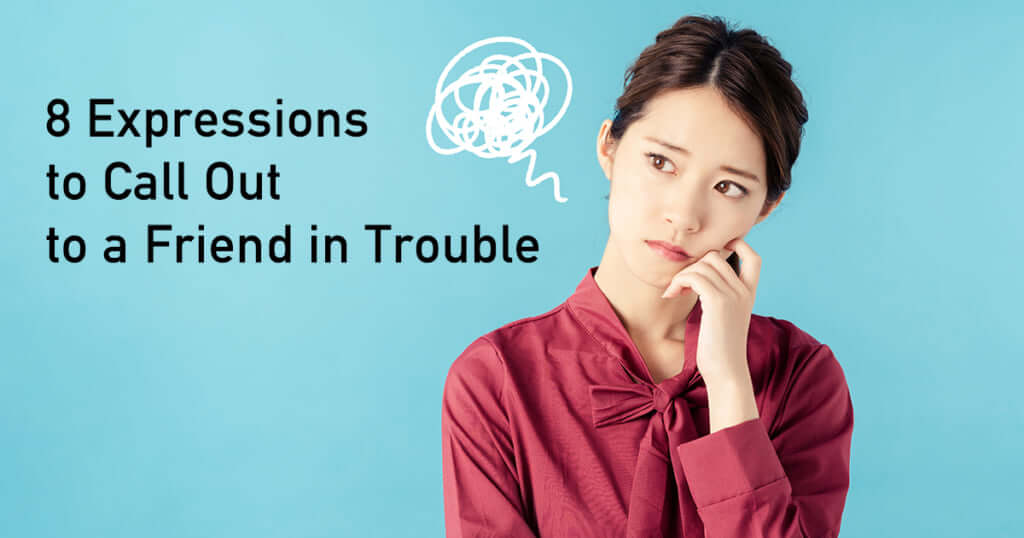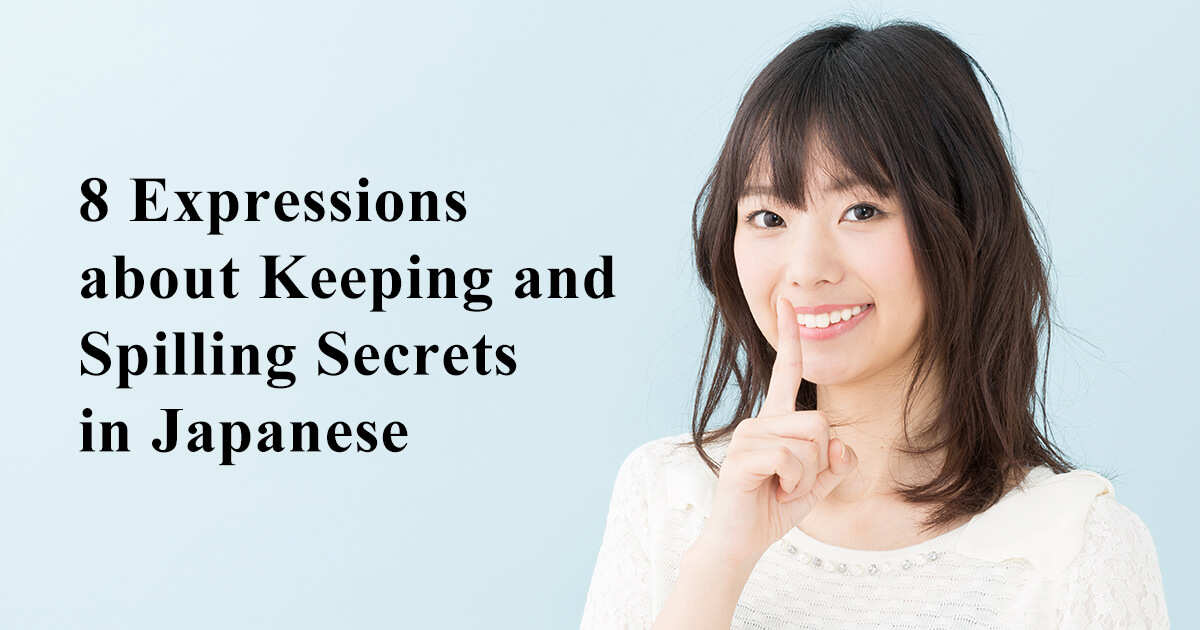
Hello. We received the following question below.
I met my friend Yoshiko back from my university days. We had a good time over lunch but I happened to see her looking at her smartphone with tears in her eyes outside the toilet. Something must be worrying her.
I wanted to ask her about it but how should I go about doing it?
Today, let’s think about phrases to call out to a friend in trouble.
大丈夫(だいじょうぶ)?
Daijoobu?
(Are you okay?)
Try asking casually “Daijoobu?” (Are you okay?) You can add “desuka” to make it a little more formal, “Daijoobu desuka?”
何(なに)か悩(なや)んでいるの?
Nanika nayandeiruno?
(Is something troubling you?)
Use the verb “悩む nayamu” (to be troubled or worried by something) to ask if there is a problem. You can use it as a noun and ask it in this way “悩みがあるの? Nayami ga aruno?” It is a neutral expression used by both male and female.
You: よしこ、だいじょうぶ?何(なに)か悩(なや)んでいるの?
Yoshiko, daijoobu? Nanika nayandeiruno?
(Yoshiko, are you okay? Is something troubling you?)
You: よしこ、だいじょうぶ?悩(なや)みがあるの?
Yoshiko, daijoobu? Nayami ga aruno?
(Yoshiko, are you okay? Is something troubling you?)
私(わたし)で良(よ)かったら、話を聞(き)くよ。
Watashi de yokattara, hanashi o kiku yo.
(If you’re okay with me, I’ll hear you out.)
If you are a guy, you can change “私 watashi” to “僕 boku” or “俺 ore”.
You: 大丈夫?何か悩みがあるの?私で良かったら、話を聞くよ。
Daijoobu? Nanika nayami ga aruno? Watashi de yokattara, hanashi o kiku yo.
(Are you okay? Is something troubling you? If you’re okay with me, I’ll hear you out.)
うん、うん。
Un, un.
If your friend starts talking about her troubles, you can say this in response. This is what we call “aizuchi” (interjection). Interjecting the conversation at appropriate times will give the speaker the feeling that you are listening and paying attention to her story.
You can also nod while you are saying this. Mastering this “aizuchi” will make your communication in Japanese smoother.
Yoshiko: 実は私の両親、今離婚問題で家の中がめちゃくちゃなの。毎日毎日けんかばかりしていて・・・
Jitsu wa watashi no ryooshin, ima rikonmondai de ie no naka ga mechakucha nano. Mainichi mainichi kenka bakarishiteite…
(To tell you the truth, my parents are getting a divorce and it’s a mess at home. They fight every day…)
You: うん、うん。 Un, un.
Yoshiko: 私もそんな二人を見ていて、本当に苦しいんだ。
Watashi mo sonna futari o miteite, hontooni kurushinda. (I feel miserable looking at them.)
大変(たいへん)だったね
Taihen dattane
(You must be having a hard time)
Try saying this to your friend.
Yoshiko: 実は私の両親、今離婚問題で家の中がめちゃくちゃなの。毎日毎日けんかばかりしていて・・・
Jitsu wa watashi no ryooshin, ima rikonmondai de ie no naka ga mechakucha nano. Mainichi mainichi kenka bakarishiteite…
(To tell you the truth, my parents are getting a divorce and it’s a mess at home. They fight every day…)
You: うん、うん。 Un, un.
Yoshiko: 私もそんな二人を見ていて、本当に苦しいんだ。
Watashi mo sonna futari o miteite, hontooni kurushinda. (I feel miserable looking at them.)
You: 大変だったね… Taihen dattane… (You must be having a hard time)
話(はな)してくれてありがとう。
Hanashitekurete arigatoo
(Thank you for telling me)
One can get really tired just by talking about something difficult. If you say this phrase to your friend who trusted you enough to tell you her difficulties, it would certainly lift her spirits a little.
You: 大変だったね。つらい話なのに、話してくれてありがとう。 Taihen dattane. Tsurai hanashi nanoni, hanashitekurete arigatoo. (You must be having a hard time. Thank you for telling me even though it’s a tough topic.)
あまり無理(むり)をしないで。 Amari muri o shinaide. (Don’t push/force yourself.)
It’s too harsh to say “ganbatte” to someone who is already trying her best. You can say “amari muri o shinaide” instead.
You: よしこちゃん、大変だったね。でも、あまり無理をしないで。 Yoshiko-chan, taihen dattane. Demo, amari muri o shinaide. (You must be having a hard time Yoshiko. Don’t push/force yourself.)
何かできることがあったら、言って。
Nanika dekiru koto ga attara, itte.
(Tell me if there’s anything I can do.)
There’s very little you can do to help if it’s a personal problem. Even so, you can say this phrase to show that you’re always standing by your friend.
You: 大変だったね。 Taihen dattane… (You must be having a hard time)
Yoshiko: うん、でも、話を聞いてくれてありがとう。 Un, demo, hanashi o kiitekurete arigatoo. (Yeah, but thanks for listening to me.)
You: 何かできることがあったら、言ってね。 Nanika dekiru koto ga attara, itte. (Tell me if there’s anything I can do.)
So how was it?
If you get closer with your Japanese friend, you may have more chances to share your worries with one another. Using an inappropriate expression may unknowingly hurt your friend when he/she is weak.
In this case, try using the kind expressions we’ve introduced today.






